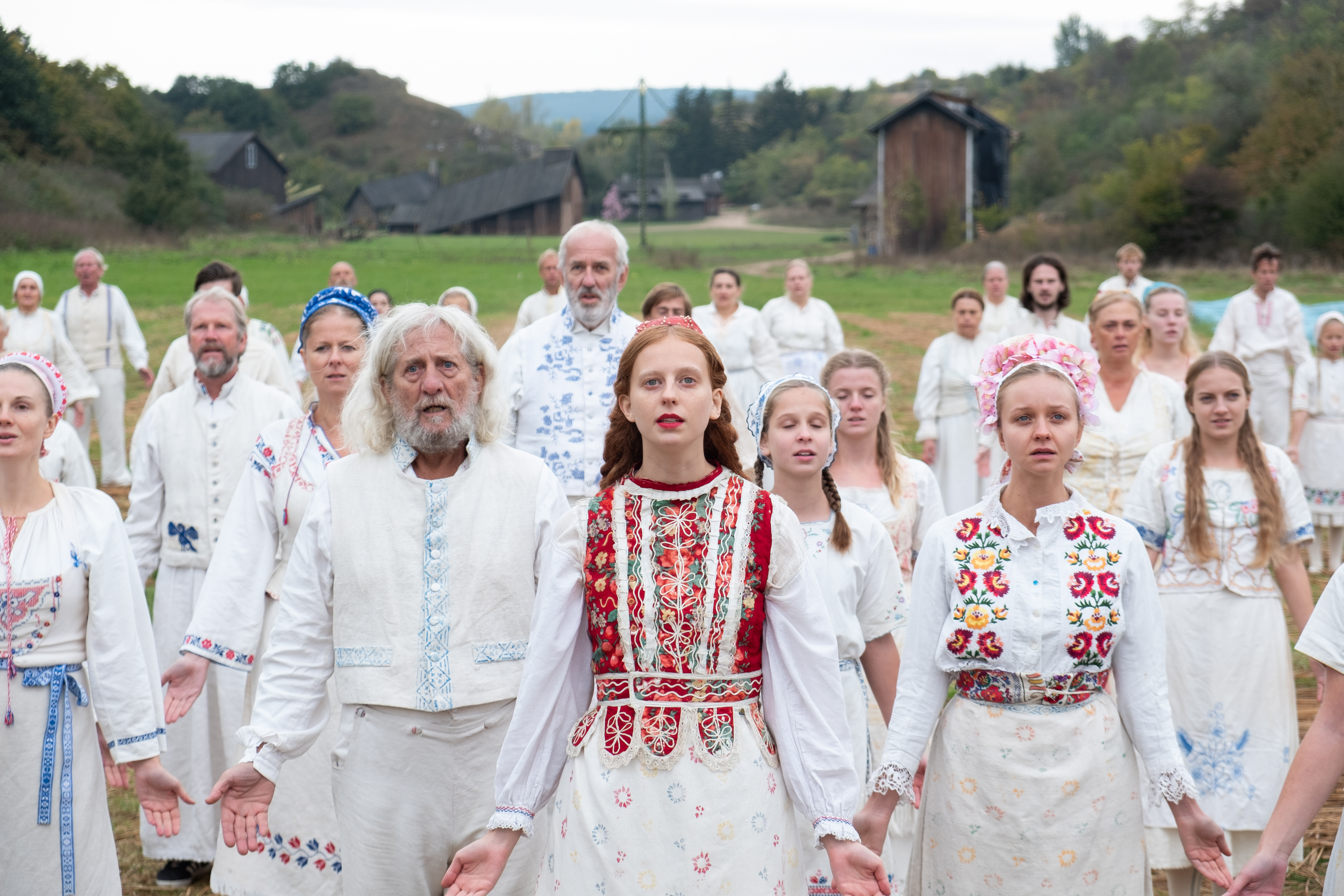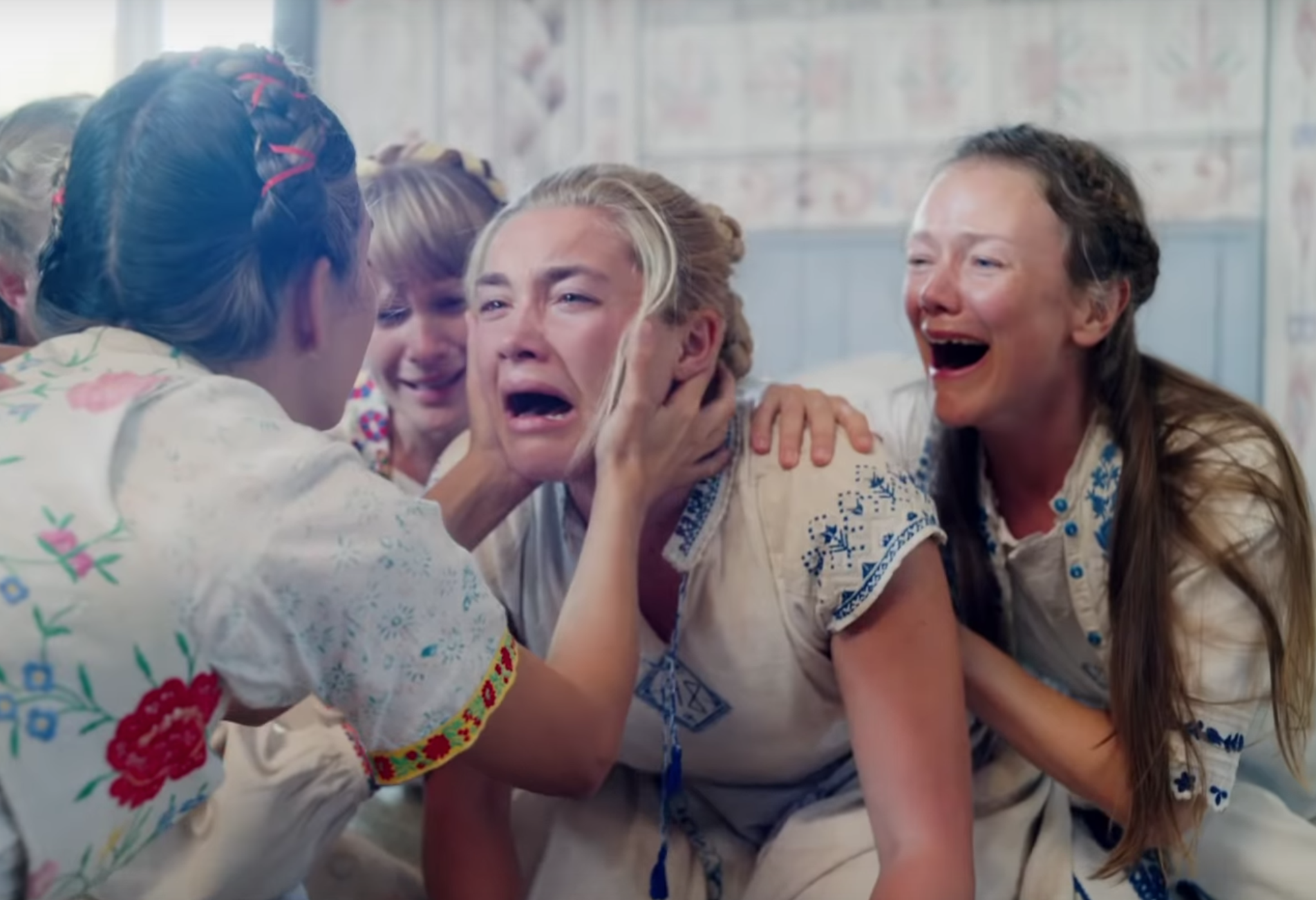In interviews, 32-year-old horror auteur Ari Aster has praised a group of predictable influences on his uncanny approach to horror filmmaking, from provocateur directors like Roman Polanski (in the mode of Rosemary’s Baby and Repulsion) to Michael Haneke to Lars Von Trier. But a more unusual spiritual forebear for Aster is British filmmaker Mike Leigh, the revered specialist in kitchen-sink dramas and precisely researched 19th-century period pieces. “Leigh is an inspiration but not an influence,” Aster told Indiewire last year. “I go to his films just to remind myself what I want out of movies about people…and remember what it is that makes us care about any story in the first place — the people at the heart of it.”
Aster’s praise of Leigh gets at the most compelling connecting thread between the two tour de force features the young writer and director has released to date—last year’s chilling possession flick Hereditary and this month’s Midsommar, a cult horror epic about American graduate students visiting a Swedish midsummer celebration in a remote village. Unlike Hereditary, Midsommar is not built on a backbone of scares, and Aster himself has characterized it as “not overtly a horror movie.” But at the center of both films is a loving attention to character development. Just two years into his career, the director has already proven himself able to elicit rich, emotionally acute performances from his actors, and his writing for them goes well beyond the level of detail that even the most ambitious art-horror directors might consider necessary to their purpose. As in Leigh’s films, Aster spins familiar genre character types into fully formed personalities whose moment-to-moment struggles pull at the threads of our lived experience.
The emotional charge of Hereditary stems from two instances of traumatic loss, and is more devastating than Aster’s new film, but Midsommar’s dominant interpersonal drama feels immediately, painfully familiar. Despite the fact that the film also begins with grisly deaths in the family, the action ultimately centers around a simpler, less sensational scenario: a relationship between two twenty-somethings that is slowly crumbling. The persuasiveness of the embattled relationship between Dani (Florence Pugh) and Christian (Jack Reynor) becomes the key to everything in the film—the driving force behind the horror mythology. Though Midsommar often feels like an ensemble, the action is seen largely from Dani and Christian’s perspectives. Often, Christian’s callous miscalculations as he tries to string Dani along makes their interpersonal interactions feel almost as horrifying as the film’s most degenerate rituals. An argument over Christian planning the long trip to Sweden with his friends without alerting Dani is one of the movie’s most discomfiting moments, like a passive-aggressive, millennial update of the acidic atmosphere of Ingmar Bergman’s marriage films.
 Just as it’s hard to talk about Hereditary without praising Toni Colette’s portrayal of mourning mother and conceptual artist Annie Graham—raw enough that it often feels as if the film can hardly contain it—Pugh’s empathetic, heartbreaking, and darkly funny portrayal of Dani is integral to Midsommar’s success. Before being cast into a pagan Scandinavian nightmare, she is dealing with the death of her parents and sister, and trying to salvage a relationship with a boyfriend who shows insufficient empathy for her situation. Sleeping pills and Ativan stave off panic attacks as memories of past trauma blur her past and present together. For most of the film, Pugh’s character is poignantly forgiving of Christian’s gaslighting micro-campaigns, constantly re-convincing herself that she is ”lucky to have [him]” in moments of weakness and doubt. In the tradition of Mia Farrow’s Rosemary, Dani comes to terms with the distressing reality of both her self-absorbed partner and her cultish surroundings at once. When she finally challenges him with a snarky aside in response to another male character seemingly betraying his girlfriend (“I could see you doing something like that”), it’s a major cathartic turn, and another of the films many funny moments that stem from Christian’s all-too-believably detestable behavior.
Just as it’s hard to talk about Hereditary without praising Toni Colette’s portrayal of mourning mother and conceptual artist Annie Graham—raw enough that it often feels as if the film can hardly contain it—Pugh’s empathetic, heartbreaking, and darkly funny portrayal of Dani is integral to Midsommar’s success. Before being cast into a pagan Scandinavian nightmare, she is dealing with the death of her parents and sister, and trying to salvage a relationship with a boyfriend who shows insufficient empathy for her situation. Sleeping pills and Ativan stave off panic attacks as memories of past trauma blur her past and present together. For most of the film, Pugh’s character is poignantly forgiving of Christian’s gaslighting micro-campaigns, constantly re-convincing herself that she is ”lucky to have [him]” in moments of weakness and doubt. In the tradition of Mia Farrow’s Rosemary, Dani comes to terms with the distressing reality of both her self-absorbed partner and her cultish surroundings at once. When she finally challenges him with a snarky aside in response to another male character seemingly betraying his girlfriend (“I could see you doing something like that”), it’s a major cathartic turn, and another of the films many funny moments that stem from Christian’s all-too-believably detestable behavior.
Also Read
Parker Posey: Gen X Marks the Spot
The outright horror action in Midsommar kicks into full gear once Dani and Christian’s unstable bond becomes a clear weakness that the eerily beaming Swedish revelers can exploit. Their psychological manipulations are facilitated by polite entreaties in cute broken English. They ply their American guests with a steady stream of hallucinogens, and Midsommar gradually reveals itself to be the most terrifyingly accurate film about psychedelic mushrooms ever produced. The dosing helps pulls the movie into a vortex of subjectivity. Haunted memories seep into the present and warp it, and supplication to even the most sadistic directive becomes impossible for the American intruders to resist. In this context, Aster’s eerie pastoral scenarios turn from Wicker Man fan fiction into something more depraved, and distinct to his sensibility.
 Wisely, Aster makes all the logistical details of his cult’s religion a secondary concern in the movie. He avoids sabotaging the mystique of the project with info-dumps guaranteed to provoke more literally minded viewers into poking holes in his horror mythology. The most strikingly ambiguous element is not knowing exactly how much of the chain reaction of chaos and destruction is premeditated by the cult members, and how much is the result of the students’ specific action once arriving. Aster gives us just enough an idea of the town elders’ game of 12-dimensional chess, and leaves many of their philosophies wrapped up in a spontaneously generated piece of scripture that no one can interpret. Since the film is mostly from the perspective of two people who are too scared, overwhelmed, or high to find order in the stimuli swirling around them, the film sustains its effectiveness by preserving a sense of unknowing.
Wisely, Aster makes all the logistical details of his cult’s religion a secondary concern in the movie. He avoids sabotaging the mystique of the project with info-dumps guaranteed to provoke more literally minded viewers into poking holes in his horror mythology. The most strikingly ambiguous element is not knowing exactly how much of the chain reaction of chaos and destruction is premeditated by the cult members, and how much is the result of the students’ specific action once arriving. Aster gives us just enough an idea of the town elders’ game of 12-dimensional chess, and leaves many of their philosophies wrapped up in a spontaneously generated piece of scripture that no one can interpret. Since the film is mostly from the perspective of two people who are too scared, overwhelmed, or high to find order in the stimuli swirling around them, the film sustains its effectiveness by preserving a sense of unknowing.
As the film progresses, the story becomes increasingly Dani’s, which allows Aster to draw our sympathies increasingly toward the cult members, who support her in their own perverse way. Their deception and brutality arise from a shared ideology that is consistent, unmotivated by ego, and founded on generally egalitarian principles—particularly in regards to gender. Self-effacing and open to new answers, Dani finds her own kind of positive reinforcement within this framework. The inhabitants of the town seem to experience every emotion and physical sensation together, and help shoulder Dani’s grief and anger. In the face of this powerful communal energy, Aster shows Dani’s defenses come down, illustrating the change in her by focusing on the smallest details of Pugh’s face.
In Midsommar, Aster proves that his ability with actors and his thoughtful character writing is not only an incidental strength, but the source of the terror in his films. In thoughtfully framing his creepy, Jodorowsky-like ritual scenes around a simple central emotional conflict, he makes the interpersonal and transitional scenes that usually don’t work—even in very good horror movies—shine. Making logical leaps of faith is much easier; the graduate students’ ability to shrug off insane and unconscionable behavior feels plausible. Whereas Hereditary was a masterclass in throwing everything at the wall, cleverly flipping stock horror tropes, and eliciting visceral scares, the more protracted Midsommar is much less of a raw onslaught; it’s an exercise in doing more with less, which truly highlights the true source of Aster’s genius. The sinister action develops like watching an unholy coloring book being slowly filled in, with the devil’s limbs being shaded one by one. The experience is hypnotic and often joyful, and a journey that we take with Dani. The fact that we feel like we are sharing it with her is what distinguishes Midsommar as an exceptional cinematic achievement.




